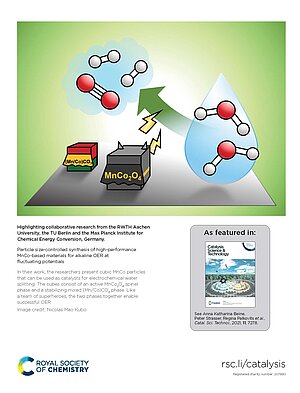For large-scale production of hydrogen by water electrolysis, the development of long-term stable and active catalysts for the oxygen evolution reaction (OER) remains a key challenge. Most catalysts suffer from severe structural corrosion, which becomes even more pronounced with fluctuating potentials.
A team of scientists from RWTH Aachen University, TU Berlin and MPI CEC has synthesized cubic manganese- and cobalt-containing particles which can be used as catalysts for the electrochemical water splitting reaction. The cubes are composites of different manganese and cobalt compounds, such as spinels or carbonates. Together the two phases (an active MnCo2O4 spinel phase and a stabilizing mixed (Mn/Co)CO3 phase) enable the reaction - like a superhero duo.
The team, which also includes Prof. Dr. Regina Palkovits, Max Planck Fellow at MPI CEC and Dr. Katharina Beine, group leader at MPI CEC, summarized the research results in a paper recently published in the journal Catalysis Science & Technology. There, the two phases are also depicted as a superhero duo in the published cover feature (see figure).
Original publication: Broicher, C., Malte Klingenhof, M., Frisch, M., Dresp, S., Mao Kubo, N., Artz, S., Radnik, J., Palkovits,S., Beine, A.K., Strasser, P., Palkovits, R. (2021). Particle size-controlled synthesis of high-performance MnCo-based materials for alkaline OER at fluctuating potentials. Catal. Sci. Technol., 2021,11, 7278-7286. https://doi.org/10.1039/D1CY00905B

